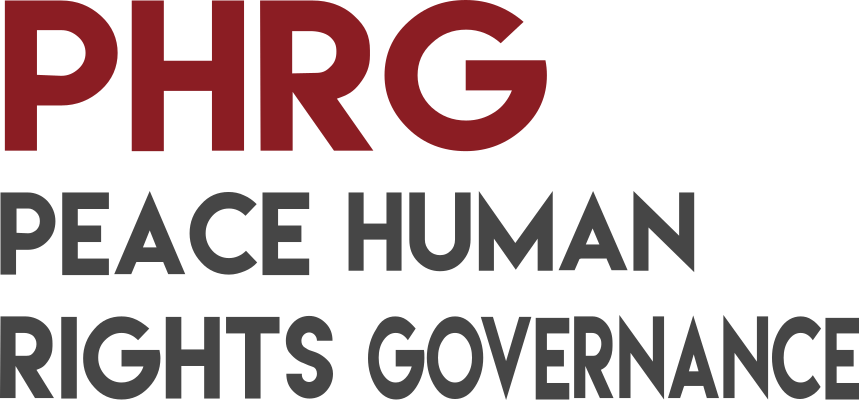Aims and vision
PHRG constitutes a scientific resource within the growing multi-faceted human rights studies community. It aims to publish original contributions to emerging debates at the crossroads between human rights, peace and governance issues, while actively favouring the development of a sound multi- (and inter) disciplinary and multi-level approach to research and dissemination on these matters. It contributes to the Padova Human Rights Centre’s vision of promoting the realisation of a culture founded on universal values such as human rights, peace, preservation of the environment, and international solidarity in the field of academic publishing.
The journal is completely open access and it is six-monthly (two issues per year). Accepted papers are immediately published with a DOI in the “online first” section of the site and then collected into periodic issues.
PHRG publishes original research articles, practitioner papers, policy papers as well as review papers and book reviews (see manuscript submission for details).
The Editorial Board is composed of a group of international human rights researchers from different disciplinary backgrounds. It is supported by an Advisory Board of renowned international human rights scholars and practitioners.
PHRG has a broad scope. It is particularly interested in contributions on issues related to the actors, processes and norms that shape the human rights agenda at different levels of governance. Within this larger frame, some specific topics include (but are not limited to):
- human rights relationships with world order and global governance issues, international law, international politics and organisation;
- Human rights monitoring mechanisms at the international, regional and national levels;
- the relation of the human rights agenda with subsidiarity and multi-level governance, city diplomacy and local policies and services;
- policies to address the human rights of specific groups (women, children, migrants, persons with disabilities, indigenous people), vulnerability and non-discrimination issues;
- trafficking in human rights;
- the promotion of human rights and peace in national and European foreign policies;
- sustainable development governance, human rights and the climate crisis;
- international and cosmopolitan democracy and global citizenship;
- civil society transnational networks advocacy on human rights, human security, peace and climate justice;
- religions and human rights;
- people’s rights and self-determination;
- media, data governance and human rights;
- the human right to peace, conflict transformation/conflict resolution;
- human rights and peace-centred education processes;
Heritage
Launched in 2017, the year of the 35th anniversary of the University of Padova Human Rights Centre (founded in 1982 by Antonio Papisca, and currently named after him), PHRG is the latest expression of this Centre’s long-standing scientific commitment to disseminate human rights research and knowledge. Before PHRG, the Padova Human Rights Centre published the series Pace Diritti dell’Uomo, Diritti dei popoli, Padova: Liviano and Cleup (1987-1996); and Pace diritti umani – Peace Human Rights, Venice: Marsilio (2004-2013), the Italian Yearbook of Human Rights series, Brussels: Peter Lang (2011- 2023), and has edited the Human Rights Studies Series, Brussels: Peter Lang (2011- ongoing).
The Journal is framed within a solid and complete human rights higher education programme at the University of Padova, which comprises the 3-year Bachelor Degree Programme in Political Science, International Relations and Human Rights, the 2-year Master Degree Programme in Human Rights and Multi-level Governance, and the International Ph.D Programme in Human Rights, Society and Multi-level Governance.
Indexing
PHRG is indexed in Google Scholar, Ebsco Host, The Database of Open Access Journal (DOAJ), the European Reference Index for the Humanities and the Social Sciences (ERIH PLUS).
PHRG is included in Italy's list of scientific journals (Anvur) for Areas 12 (law) and 14 (social sciences).
Peer review policy
PHRG Editors make an initial quality screening process before selecting articles for refereeing. The papers judged to be of insufficient interest or scientific quality may be desk-rejected without formal review. These decisions may be based on informal advice by external experts.
Articles passing the screening process are sent out for peer review. Editors aim to reach a first decision on all articles (initial screening) within 2 weeks from the submission. If the article is not considered appropriate, the Author(s) will receive an email notification from the Managing Editor.
The usual time from manuscript selection to the Author’s receipt of the PHRG’s decision about publication is 10-12 weeks. During that time each manuscript undergoes a rigorous double-blind review by independent expert reviewers.
The possible outcome decisions are a) accept as it is; b) accept with minor changes as suggested in review reports, without further review; c) return to Author for changes and subsequently resubmit (major revisions); d) reject.
If the paper is accepted, it is responsibility of the Author to ensure that English is correct, and that the form and style of the paper, including with respect to references and bibliography, have been strictly followed. When the paper is ready in content and form, it is immediately sent to the Editorial assistant at Padova University Press to publish it “online first” with a DOI (the article will then be collected in periodic issues).
Open access policy
PPHRG provides immediate open access to its contents on the principle that making research freely available to the public supports a greater global exchange of knowledge.
license
Issues are published under CC BY-NC-SA license.
![]()
Publication charges
There is no submission or publication fee.
Other Series of the University of Padova Human Rights Centre
Italian Yearbook of Human Rights
Peter Lang’s Human Rights Studies Series
Pace Diritti Umani - Peace Human Rights
Pace Diritti dell’Uomo, Diritti dei popoli
Aknowledgments
Cover picture: 'Ohne Titel'; by Wassily Kandinsky, 1923, greyscale detail
Logo font: Lemon/Mint by Marsnev

 © 2026 Padova University Press - Università degli Studi di Padova
© 2026 Padova University Press - Università degli Studi di Padova